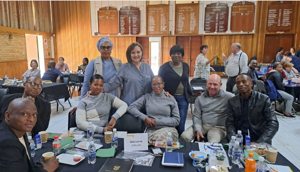23/11/2024 - Fedsas

There was no shortage of challenges in South African education this year. Between school governing body elections, the formation of the Government of National Unity and a new Minister of Education, BELA, concerns over the cutting of posts and other financial challenges, an uproar about “buying” players for school sports, and all the regular little foxes in the vineyard one wonders how quality education could continue on a daily basis.
For the Federation of Governing Bodies of South African Schools, the answer is simple. “We continue to create opportunities,” says Dr Jaco Deacon, CEO of FEDSAS. “Some opportunities we create; others are sent our way in the form of challenges. To adapt and innovate is only possible if creating opportunities is a habit. This is why we are at the forefront of innovation in the education sector and also why FEDSAS is an influential and recognised role-player in the sector.”
Talk is cheap but FEDSAS also boasts a long list of activities, projects, and other enterprises as evidence of the organisation’s commitment to its goal of quality education for all the children of South Africa. “This year, FEDSAS travelled far and wide to provide sound advice and support to members. Some of our opinions on important matters were not equally popular everywhere but are based on proper consideration and expertise.”
FEDSAS’s members are the governing bodies of schools. Members are diverse and represent the full spectrum of the South African society. “To ensure that we serve all our members’ interests, the FEDSAS approach is based on cooperation with a variety of role-players. We met with the new Minister of Education, Siviwe Gwarube, shortly after her appointment. We could inform her on our activities and the interests of our members, and we could also offer our experience and expertise. We often collaborate with legal officials of the SAOU (South African Teachers’ Union), and we have strategic partnerships and discussions with, among others, Anglo-American, SADTU and the Royal Bafokeng Institute to expand our footprint.”
FEDSAS has a national footprint with nearly 2000 members across all nine provinces. This year, FEDSAS staff travelled more than 190 000 km for school visits, training sessions and more than 250 meetings with provincial education departments. SGB elections took place early this year. After the elections, FEDSAS presented 589 training sessions to new SGBs, with more than 14 000 SGB members attending the sessions. More than 100 non-member schools were also involved through 16 sessions.
Following the President’s signing of BELA in September, FEDSAS continued to provide inputs on the controversial clauses on language and admission policies. However, the organisation also started with BELA training immediately, presenting 14 provincial sessions. These sessions as well as several online sessions reached a total of 10 201 people. The sessions were presented in cooperation with the SAOU.
To counter the environmental impact of the thousands of kilometres travelled, and to increase accessibility, more online opportunities were made available. More than 15 000 people registered for a variety of webinars this year.
While these numbers are impressive, the outcomes and impact are what matters. FEDSAS’s proposals on election regulations for SGB elections were incorporated into law. In North-West, illegal processes regarding appointments were stopped, as were one-sided and forced capacity determinations in Gauteng. In Limpopo school fee exemptions were paid to schools.
The FEDSAS Centre for Finance and Risk Management is still involved in the review of the formula used to determine school fee exemptions. “Our research indicates there are fewer than 3000 fee-paying schools in quintiles 4 and 5. Financial concerns remain a challenge for school governance. The introduction of our Pocket Guide to School Budgets is aimed at assisting SGBs in this regard.”
In other areas FEDSAS also created opportunities throughout the year. With the inclusion of Coding and Robotics in the school curriculum, the FEDSAS Centre for Technology expanded existing resources to assist schools with the implementation of the new subjects. Schools also face increased challenges with emotional wellbeing of both staff and learners. FEDSAS partnered with forensic social worker Miranda Cussons to develop wellness manuals for counselling services at schools.
Another guide introduced this year is Governance in independent schools: A guide to the application of the King principles in independent schools, an adapted version of the original publication for public schools. FEDSAS recently made the organisation’s expertise and comprehensive resources available to independent schools. Since then, several independent schools joined the organisation, and two mini summits were presented for these schools.
“In the end, the real value comes from our people. Behind every number and list there are passionate people who care about the interests of our members. FEDSAS is a people organisation with people as members and partners. The most important aspect is that our activities have an influence on children. We take this duty very seriously.”
Deacon says FEDSAS’s plans for next year are ready. “This includes how to plan for the unforeseen! Innovation and adaptation are only possible because the organisation operates from a foundation of established and proven practices built over more than three decades. It is the vision of the people of yesterday that enables us to be the people of today with the capacity to build the future of the people of tomorrow.”